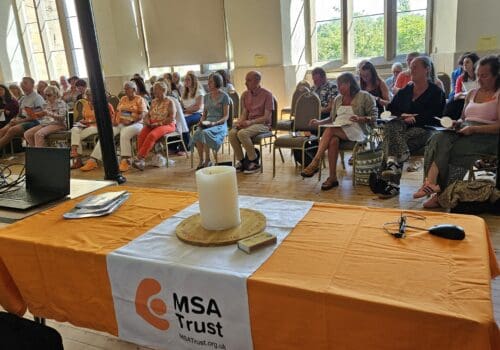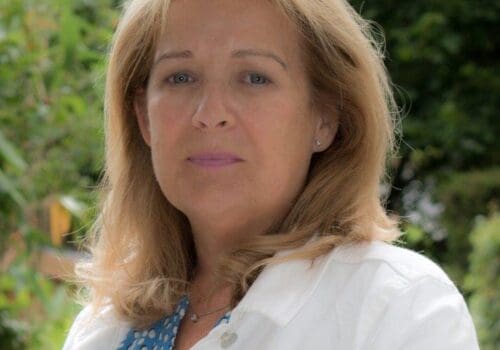How do bags of rubbish reveal anything about research?
John Telford updates on the Trust’s recent Scientific Advisory Panel meeting.
The Trust’s Scientific Advisory Panel (SAP) met on Monday, 23 November. This group’s role is to recommend which research projects should be funded by the Trust with its limited resources. Research is expensive and so it is important to assess carefully where the money should be spent in order to get the greatest benefit in terms of finding a cure or better treatments for MSA. But a large part of the latest meeting was spent reviewing some of the currently funded projects to see what they were achieving.
The SAP has many world class researchers on it in the realm of MSA and other neurological diseases. Clearly they know what they are talking about. But MSA is so complex that not enough is yet known to allow us to come up with that elusive silver bullet that will stop it in its tracks.
The SAP also has two lay members on it – myself and David Oldershaw. Our role is to represent the views of the community of people living with MSA as patients and carers. In short our role is to see that your money is spent in a way which represents your concerns and priorities. The more we understand about the research taking place, the more confidence we can have that the priorities are right.
For instance, to take an example from everyday life, if we should notice that loads of rubbish-filled black plastic bags were stacking up in the streets it would likely not take us long to find out that the dustmen were on strike. The normal solution should then be obvious: negotiations between them and the council to identify the grievances and settle the dispute. One MSA research project1currently underway is a bit like that. In MSA a rogue form of a protein called alpha-synuclein stacks up in certain brain cells and, like refuse, is toxic to the health of those cells. This project is aiming to find out why the enzymes that usually clear away this rubbish are not working properly. Perhaps boosting them – a pay rise? – would get things back to normal!
I am tempted to push this analogy further. What if the inability to pay the dustmen enough is due to the council itself having to make draconian spending cuts? A topically contentious issue perhaps but it is a bit like having trouble with the powerhouses of all cells in the body, the mitochondria. Failure of these is being implicated in a number of neurological diseases and they are the focus of another MSA research project2.To take this one step further, what if the social unrest caused by austerity led to demonstrations on the street and the use of force to control it? Malfunctioning mitochondria actually stimulate an inflammatory reaction – neurological diseases are characterised by neuroinflammation. Inflammation has two components: an aggressive one and a healing one. What if the aggressive/destructive component (the riot police?) overwhelms the healing/conciliatory one and the situation gets worse? That’s what another project3 is looking at: is neuroinflammation a good thing or, in diseases like MSA, has it got out of control and is making the disease worse?
Going by their titles these and the other projects supported by the MSA Trust seem to be looking at different things based on different hypotheses about the underlying problem. Actually they are looking at the same problem from different but related angles.
Other projects are looking at the disease ‘in the round’ to discover all the ways in which the biochemistry in MSA has got ‘out of kilter’. Seeing the bigger picture should give clues as to how to intervene to reinforce the natural processes that have failed to keep the disease at bay or have been corrupted to do more harm than good4.
And you? Another large project that the Trust is supporting is the Prospect Study – The MSA Network – that I wrote about in my last blog. Do consider registering with it.
Also, please respond to me if you are interested in learning about more of the details of the research projects that the MSA Trust is supporting and maybe we could see whether starting a members’ research interest group would be feasible.
John
1So that you know that I am not making this up, the project is
Holton & Love (1402HoLo) Understanding the degradation of α-synuclein protein in multiple system atrophy. It is due to complete in January 2017. https://www.msatrust.org.uk/research/funded-research/on-going-research/dr-aiofe-kiely/
2Holton The Role Of C0Q2 In Multiple System Atrophy. It is due to complete in February 2017. https://www.msatrust.org.uk/research/funded-research/on-going-research/professor-janice-holton/
3Holton Neuroinflammation in multiple system atrophy: A neuropathological study. The data is now being analysed and is likely to lead to more work to answer important questions that the study has thrown up.
4For instance see: https://www.msatrust.org.uk/research/funded-research/on-going-research/dr-lucia-schottlaender/
Disclaimer: The views and opinions expressed in the blogs published on these pages are those of the authors and do not necessarily reflect the official policy or position of the MSA Trust.
Recent Posts

MSA Candlelight 2025
19 Jun 2025 | 2 comments

International Nurses Day 2025
12 May 2025 | 1 comment

